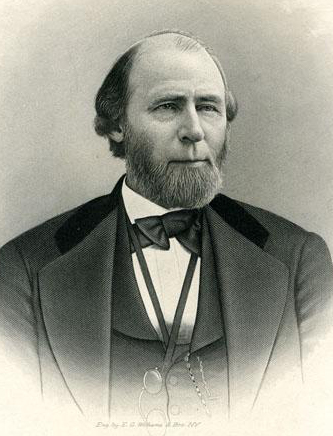William Holden had been involved in North Carolina politics since the 1840s, having been elected to the North Carolina General Assembly in 1844. During the Civil War, Holden supported the Union and tried to encourage North Carolinians to accept peace and to end slavery rather than face a long, bloody war. In 1865, Holden was appointed by President Andrew Johnson as the provisional governor of North Carolina, but was defeated in an election later that year.
In 1868, when Reconstruction had established a Republican majority in North Carolina, Holden was elected governor. During his time in office, Holden had to reorganize the government, open public schools, reform the constitution, rebuild railroads and bridges, and stimulate the state economy. He also had to ensure the equal treatment of all people in North Carolina. Many whites in North Carolina were reluctant to give up the system of slavery, and many refused to respect the civil rights of freed people. Some North Carolinians organized local chapters of the Ku Klux Klan in an effort to intimidate African Americans and white Republicans and to restore Democrats to power.
Holden tried to stamp out the Klan. In this address to the General Assembly, Holden asked representatives to give him more power so that he could end the violence that swept through parts of North Carolina. In response, the legislature passed the Shoffner Act, giving Holden the power to use the militia to keep order.
To the Honorable, the General Assembly of North Carolina.
Gentlemen: -- Allow me respectfully and earnestly to call your attention to the necessity which exists for such amendments to the militia law as will enable the executive to suppress violence and disorder in certain localities of this State, and to protect the persons of citizens, their lives and their property.
Since my last annual message, dated Nov. 16th, 1869, numerous outrages of the most flagrant character have been committed upon peaceable and law-abiding citizens, by persons masked and armed, who rode at night, and who have thus far escaped the civil law. I have adopted such measures as were in my power to ferret out and bring to justice all breakers of the law, without reference to their color or to the political party or parties to which they belong, and I am satisfied that Judge and solicitors in the various circuits have been prompt, energetic and impartial in the discharge of their duties. Notwithstanding this, Gentlemen, the outrages referred to seem to be rather on the increase in certain localities in so much that many good citizens are in a constant state of terror and society in said localities is in a deplorable condition. It is for your honorable body to apply the remedy by so strengthening the arm of the executive as to enable him to repress these outrages and restore peace and order. I have confidence in your wisdom, in your regard for law, and in the disposition which I feel sure exists in every member of your honorable body to adopt such measures as will speedily put an end to the evils complained of.
I have the honor to be, Gentlemen, with great respect,
Your obedient servant,
W. W. HOLDEN, Governor.
Source Citation:
Holden, William Woods. Memoirs of W.W. Holden. Durham: The Seeman Printery, 1911. Published online by Documenting the American South. University Library, University of North Carolina at Chapel Hill. https://docsouth.unc.edu/fpn/holden/menu.html

